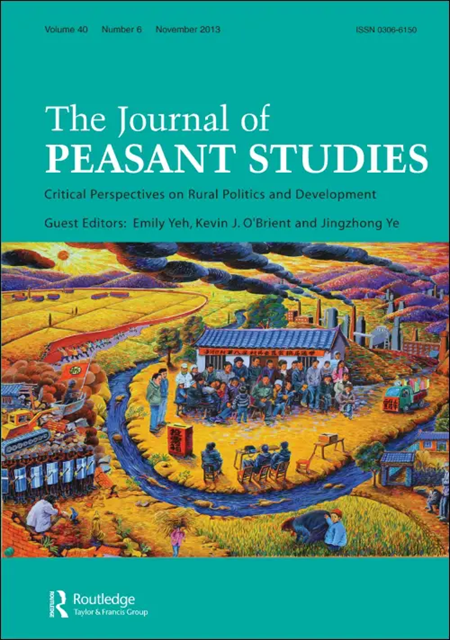虾区的生活:孟加拉国沿海景观的水和其他文化
IF 4.8
1区 社会学
Q1 ANTHROPOLOGY
引用次数: 116
摘要
本文质疑粮食主权产生激进平等主义政治的可能性。具体来说,它探讨了在生态危机区-孟加拉国沿海库尔纳地区粮食主权的阶级分化含义。在这个三角洲地区,以前用于各种形式的农民生产的许多土地,由于引进咸淡水虾养殖而发生了变化。这反过来又在整个地区造成了大规模的非农化和生态危机。通过对两个明显不同的圩田(堤岸岛屿)的考察——一个是虾类生产过剩,另一个是抵制虾类生产——我们询问沿海社区及其成员如何根据他们的相对阶级地位和获得土地的途径,以不同的方式协商他们迅速变化的生态和食物系统。我们强调,来自不同阶层的农民不仅赋予虾多种含义,而且还赋予虾在不确定地形中的适应、社区和生活等更广泛的问题。我们表明,虽然非虾类地区的粮食主权避免了影响虾类地区的非农化,但它并不一定导致农业阶级关系中更大的平等。为了实现这些目标,我们建议,一个更广泛的土地主权概念为农业生产中的自决提供了一个关键和必要的推论。本文章由计算机程序翻译,如有差异,请以英文原文为准。
Life in a shrimp zone: aqua- and other cultures of Bangladesh's coastal landscape
This essay questions the possibilities of food sovereignty for producing a radical egalitarian politics. Specifically, it explores the class-differentiated implications of food sovereignty in a zone of ecological crisis – Bangladesh's coastal Khulna district. Much land in this deltaic zone that had previously been employed for various forms of peasant production has been transformed by the introduction of brackish-water shrimp aquaculture. This has, in turn, caused massive depeasantization and ecological crisis throughout the region. Through an examination of two markedly different polders (embanked islands) – one which has been overrun by shrimp production and one that has resisted it – we ask how coastal communities and their members have variously negotiated their rapidly changing ecologies and food systems based on their relative class position and access to land. We highlight the multiple meanings that peasants from different classes ascribe not just to shrimp, but also to broader questions of adaptation, community and life in uncertain terrains. We show that while food sovereignty in non-shrimp areas has averted the depeasantization affecting shrimp areas, it has not necessarily led to greater equality in agrarian class relations. To achieve such ends, we suggest that a broader conception of agrarian sovereignty provides a critical and necessary corollary to self-determination in agricultural production.
求助全文
通过发布文献求助,成功后即可免费获取论文全文。
去求助
来源期刊

Journal of Peasant Studies
Multiple-
CiteScore
10.50
自引率
17.60%
发文量
99
期刊介绍:
A leading journal in the field of rural politics and development, The Journal of Peasant Studies (JPS) provokes and promotes critical thinking about social structures, institutions, actors and processes of change in and in relation to the rural world. It fosters inquiry into how agrarian power relations between classes and other social groups are created, understood, contested and transformed. JPS pays special attention to questions of ‘agency’ of marginalized groups in agrarian societies, particularly their autonomy and capacity to interpret – and change – their conditions.
 求助内容:
求助内容: 应助结果提醒方式:
应助结果提醒方式:


